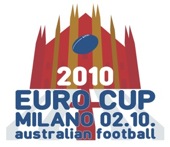Euro Cup comes to Milan this weekend
- Friday, October 01 2010 @ 12:06 pm ACST
- Contributed by: Aaron Richard
- Views: 5,959


While Australia is being treated to a second Grand Final this weekend, on the other side of the world, another big day of footy will also taking place: the Euro Cup. This year the annual 9-a-side Australian Football tournament will be held in Milan, Italy.
The competition has only been running since 2005, but in that time it has grown dramatically in terms of nations competing and players participating, and its growth is reflective of the growing popularity of the game in Europe.
The 2010 Euro Cup will be contested by 15 countries. Wales and Switzerland will be taking part for the first time where they join other emerging football-playing nations such as Austria, France, Catalonia, Spain, the Netherlands, Italy, the Czech Republic, and Scotland. England, Ireland, Germany and Croatia, who are all relatively well established, will also be involved.
This year’s Euro Cup will also feature the first ever women’s international in Europe, between Italy and Ireland.
This article courtesy of Nic Townsend.
Originally the competition was 9-a-side so as to reduce the demands on playing squads. Since then Australian Football in Europe grown to such an extent that it was possible to hold a full 16-a-side European Championship in Sweden and Denmark last August.
However the 9-a-side format is still vital for the development of the game as it makes it significantly easier for smaller countries to take part.
Last August Ireland won the first ever European Championships in Sweden, and will naturally be favourites to take out this year’s Euro Cup. However the switch to 9-a-side does change the dynamics. “We’d hope that we’ll be a contender but none of the players we’re taking have very much experience of 9-a-side football,” says Ireland’s Ciaran O'Hara. “The biggest difference will be the speed: 9-a-side games are end-to-end and high scoring so we expect a real challenge.”
For a long time the commonly held assumption was that Australian Football abroad was only played by expats, however this is clearly not true. “French footy was set up by French people who saw the game on TV and wanted to have a go,” says French coach Adam Le Nevez.
Many of the countries taking part in the Euro Cup simply don’t have large Australian expat communities and have done everything themselves. “If there where Aussies in our team, we would have the possibility to learn from them,” says Martin Schittegg of Austria. “So far we have had to learn by watching AFL matches, reading books and by trying out whatever tactics and training methods that we can think of ourselves.”
However there are also advantages to keeping the development of the game in indigenous hands. “The development of footy must go in line with the developing local talents and not just for expats to get a kick while they work or live in Europe,” says Italy’s Nicola Giampaolo. “In Italy we have adopted the policy that Aussies should play at club level to teach local players the skills and tactics, but the national team should only have Italian players.”
Obviously you don’t have to be Australian to love Australian Football, and the Euro Cup is proof that many Europeans are just as passionate about the game as any Melbournian. Possibly even more so when you consider the lengths many teams go to just to continue playing. “Costs are our biggest obstacle – it is difficult to secure sponsorship for a minority sport, and there are obviously high costs involved with the flights and travel,” says Scotland team manager Douglas Hamilton, echoing a common problem amongst all the teams competing.
“Finding a full team of Dutch players is difficult,” agrees Josh Carmichael of the Netherlands. “While the numbers are there, many don't want to commit (and pay) for travel to play.” They might be national representatives but just about everyone in Milan this weekend has had to take off time from work or studies, and pay for their own travel and accommodation.
In most European countries, the future of the game relies on a handful of dedication individuals, and the future isn’t always certain. As Switzerland’s Mattia Sacchi says: “It can be the summer alternative to ice hockey in five years and maybe the fourth biggest team sport in seven years. Or it can all crash down in one year.” But tournaments such as the Euro Cup give everyone a goal to work towards, and a shared platform to keep the game alive and well.
As Adam Le Nevez says: “The Euro Cup is a great chance to see the brotherhood of footy in Europe - the extent to which it is growing and improving, to see competitive games, and to spend some time with a few hundred passionate fans of the game.”


 RSS news
RSS news Twitter
Twitter Facebook
Facebook